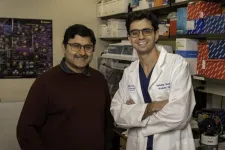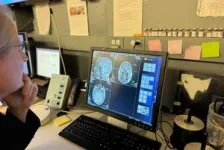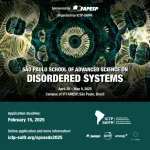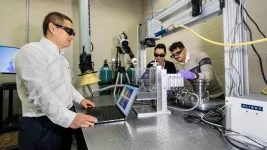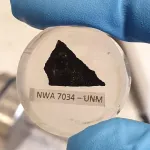(Press-News.org) The Golgi apparatus modifies, sorts and packages proteins to be sent to their final destinations, whether that’s within or outside of the cell.
It’s a core function, but little studied in the setting of cancer immunology, especially when compared to other organelles like the mitochondria or endoplasmic reticulum.
“So we were interested in looking a little bit more at the Golgi apparatus. It's obviously an important organelle. How is it being changed or what is its role in T-cells in terms of fighting cancer?” said Nathaniel Oberholtzer, an M.D./Ph.D. student who worked in the lab of Shikhar Mehrotra, Ph.D., co-leader of the Cancer Biology & Immunology Research Program at MUSC Hollings Cancer Center and scientific director of the Center for Cellular Therapy in the MUSC College of Medicine.
As it turns out, the healthy function of the Golgi apparatus has a lot to do with how well T-cells function in killing cancer cells. Understanding how a signaling axis mitigates Golgi stress, enabling it to perform properly, points to a possible new therapeutic target for researchers to pursue to strengthen T-cells. Not only that, but Oberholtzer’s research shows how the Golgi could be used as a biomarker to select the strongest T-cells for immunotherapy.
Oberholtzer, as first author, and Mehrotra, as senior author, along with a team of Hollings scientists published the research this month in Science Advances.
T-cells, part of the immune system, can kill cancer cells. CAR-T cells are T-cells that have been modified in the lab to home in on proteins on the surface of an individual’s cancer cells. CAR-T cells are custom-made for each patient.
Both T-cells and CAR-T cells can become “exhausted” in the hostile tumor microenvironment. Mehrotra’s lab looks at ways to boost these cells so that they can fight cancer for a longer time.
“The whole tumor microenvironment is conducive for the tumor itself, but not for the other cells which are trying to get in there,” Mehrotra said.
Just like people, cells are constantly subjected to stress – stress from biochemical reactions that have become unbalanced and mechanical stress from moving. Transient stress can be good. Stressing your muscles through exercise strengthens them, and transient stress on cells can prompt them to a response that ultimately strengthens them.
“But if this stress stays there, which it does in the tumor microenvironment, the cells are just in continuous stress, and that will then lead to a very different phenotype and death,” Mehrotra said.
However, the researchers found that treating the Golgi apparatus with hydrogen sulfide created T-cells that could take more stress.
“Hydrogen sulfide is a gaseous signaling molecule present in pretty much all mammalian cell types. Typically, it's a byproduct of different cellular processes, but it's actually been shown to have really important signaling roles as well,” Oberholtzer said.
“It can modify proteins through a process called sulfhydration, where it modifies cysteine residues and can change their activity.”
In this project, Oberholtzer found that this sulfhydration process, in modifying a protein called Prdx4 within the Golgi apparatus, confers protection in an oxidative setting.
“When you have the stressors that the tumor microenvironment puts on T-cells, you get a disruption, or fragmentation, of the Golgi apparatus where it essentially isn't able to do its job. Hydrogen sulfide protects against that disruption,” Oberholtzer said.
Looking into this protective effect then led the researchers to look more closely at the Golgi apparatus by itself.
“Essentially, if you just use the Golgi apparatus as a simple marker, if T-cells have a lot of Golgi versus less, the ones that have more Golgi are much more robust at killing tumor cells and controlling tumors,” Oberholtzer explained.
Using cell sorting technology at the Flow Cytometry & Cell Sorting Shared Resource at Hollings, the researchers sorted T-cells according to the amount of Golgi they contained. The top 30% were labeled Golgi-hi and the bottom 30% were labeled Golgi-lo.
“Basically, all the cells which are expressing high Golgi have a very different phenotype. They are less exhausted, and they are much more potent in controlling tumors,” Mehrotra said.
This pre-clinical work suggests that sorting T-cells into Golgi-hi and Golgi-lo and reinfusing only the Golgi-hi cells into a patient would create a better chance of controlling the tumor.
“Right now, we're working on doing some validation studies in the Center for Cellular Therapy to potentially be able to start a clinical trial to see if that has a translational ability as well,” Oberholtzer said.
More work is also needed to understand the role of Golgi stress when all of the organelles in a cell are under stress because of the tumor microenvironment.
About MUSC Hollings Cancer Center
MUSC Hollings Cancer Center is South Carolina’s only National Cancer Institute-designated cancer center with the largest academic-based cancer research program in the state. With more than 150 faculty cancer scientists and 20 academic departments, it has an annual research funding portfolio of more than $50 million and sponsors more than 200 clinical trials across the state. Hollings offers state-of-the-art cancer screenings, diagnostic capabilities, therapies and surgical techniques within its multidisciplinary clinics to provide the full range of cancer care. Dedicated to preventing and reducing the cancer burden statewide, the Hollings Office of Community Outreach and Engagement works with community organizations to bring cancer education and prevention information to affected populations. For more information, visit hollingscancercenter.musc.edu
END
New MUSC Hollings Cancer Center research shows how Golgi stress affects T-cells' tumor-fighting ability
2024-11-22
ELSE PRESS RELEASES FROM THIS DATE:
#16to365: New resources for year-round activism to end gender-based violence and strengthen bodily autonomy for all
2024-11-22
New York, NY | November 22, 2024 - On Friday the Sexual and Reproductive Justice Hub (SRJ Hub) at the CUNY Graduate School of Public Health and Health Policy (CUNY SPH) launched the newest iteration of the civil society-led Global 16 Days of Activism to End Gender-based Violence campaign.
For more than 30 years, feminist activists and movements around the world have used the 16 days between the International Day for the Elimination of Violence Against Women (November 25) and Human Rights Day (December 10) to advocate for an end to gender-based violence. ...
Earliest fish-trapping facility in Central America discovered in Maya lowlands
2024-11-22
DURHAM, N.H.—(November 22, 2024)—An archaeologist from the University of New Hampshire and her team have collected data which indicates the presence of a large-scale pre-Columbian fish-trapping facility. Discovered in the Crooked Tree Wildlife Sanctuary (CTWS), the largest inland wetland in Belize, the team dated the construction of these fisheries to the Late Archaic period (cal. 2000-1900 BCE), pre-dating Amazonian examples by a thousand years or more.
“The network of canals was designed to channel annual flood waters ...
São Paulo to host School on Disordered Systems
2024-11-22
The South American Institute for Fundamental Research (ICTP-SAIFR) is organizing the São Paulo Advanced School on Disordered Systems, which will take place between April 28 and May 9, 2025, in São Paulo city, Brazil, at the São Paulo State University’s Institute of Theoretical Physics (IFT-UNESP).
One of the goals of the school is to reach a broad audience that includes students with a diverse background who are eager to receive systematic training on powerful theoretical methods and who also display a keen interest in complexity ...
New insights into sleep uncover key mechanisms related to cognitive function
2024-11-22
While it’s well known that sleep enhances cognitive performance, the underlying neural mechanisms, particularly those related to nonrapid eye movement (NREM) sleep, remain largely unexplored. A new study by a team of researchers at Rice University and Houston Methodist’s Center for Neural Systems Restoration and Weill Cornell Medical College, coordinated by Rice’s Valentin Dragoi, has nonetheless uncovered a key mechanism by which sleep enhances neuronal and behavioral performance, potentially changing our fundamental understanding of how sleep ...
USC announces strategic collaboration with Autobahn Labs to accelerate drug discovery
2024-11-22
USC has embarked on a collaboration with Autobahn Labs, an accelerator for early-stage drug discovery, to identify and advance cutting-edge scientific findings into new therapies - with a special focus on critical unmet medical needs.
“Our collaboration with Autobahn Labs is a pivotal moment for our institution’s mission to bring academic innovations in drug discovery to market,” said Erin Overstreet, PhD, executive director of the USC Stevens Center for Innovation, which manages a broad portfolio of university-owned intellectual ...
Detroit health professionals urge the community to act and address the dangers of antimicrobial resistance
2024-11-22
DETROIT — Wayne State University's Center for Emerging and Infectious Diseases (CEID) is launching its participation in World AMR Awareness Week with an urgent message: the growing threat of antimicrobial resistance requires immediate community action, so it is critical to educate, advocate, and act now.
Antimicrobial Resistance (AMR) occurs when bacteria, viruses, fungi, and parasites no longer respond to antimicrobial agents. Because of drug resistance, antibiotics and other antimicrobial agents become ineffective and infections become difficult or impossible to treat, increasing the risk of spreading various diseases ...
3D-printing advance mitigates three defects simultaneously for failure-free metal parts
2024-11-22
University of Wisconsin–Madison engineers have found a way to simultaneously mitigate three types of defects in parts produced using a prominent additive manufacturing technique called laser powder bed fusion.
Led by Lianyi Chen, an associate professor of mechanical engineering at UW–Madison, the team discovered the mechanisms and identified the processing conditions that can lead to this significant reduction in defects. The researchers detailed their findings in a paper published on November 16, 2024, in the International Journal of Machine Tools and Manufacture.
“Previous research has normally focused on reducing one type of defect, but that would ...
Ancient hot water on Mars points to habitable past: Curtin study
2024-11-22
New Curtin University-led research has uncovered what may be the oldest direct evidence of ancient hot water activity on Mars, revealing the planet may have been habitable at some point in its past.
The study analysed a 4.45 billion-year-old zircon grain from the famous Martian meteorite NWA7034, also known as Black Beauty, and found geochemical ‘fingerprints’ of water-rich fluids.
Study co-author Dr Aaron Cavosie from Curtin’s School of Earth and Planetary Sciences said the discovery opened up new avenues for understanding ancient Martian hydrothermal systems associated ...
In Patagonia, more snow could protect glaciers from melt — but only if we curb greenhouse gas emissions soon
2024-11-22
In an era of dwindling glaciers, Southern Patagonia has managed to hold on to a surprising amount of its ice. But, A new study in Scientific Reports from INSTAAR postdoc Matthias Troch suggests that this protective effect might be pushed up against its limits soon.
Before making predictions, Troch and his collaborators looked back in time. They used an equation that, when plugged into NASA’s ice-sheet and sea-level system model, simulated glacial dynamics for the past six millenia. The results showed that precipitation, not temperature, was the main culprit of glacier fluctuation during around 4,500, of the past 6,000 years, or 76 percent of the time. In ...
Simplicity is key to understanding and achieving goals
2024-11-22
People’s preference for simple explanations of any situation is connected to their desire to execute tasks efficiently, finds a new study from the University of Waterloo.
"These findings show that our preference for simpler explanations mirrors how we evaluate actions. Simplicity isn't just valued in explanations—it's part of how we think about achieving results efficiently," said Claudia Sehl, lead author and a PhD candidate in developmental psychology at Waterloo.
Sehl collaborated with Waterloo developmental psychology professors Ori Friedman and Stephanie Denison on this study. They conducted seven experiments involving 2,820 ...
